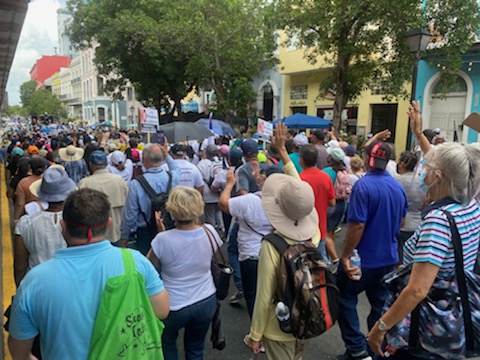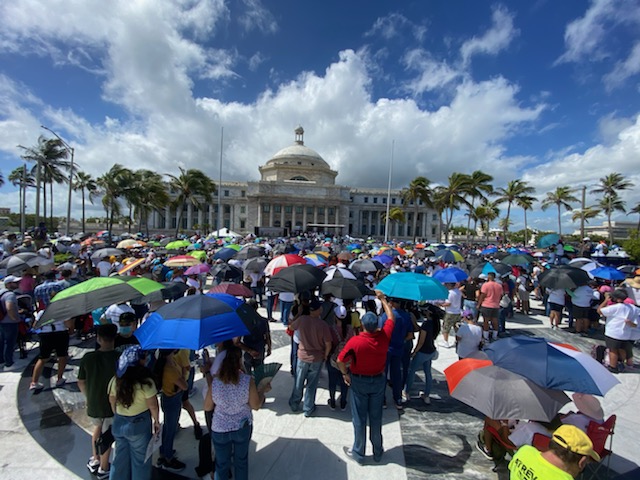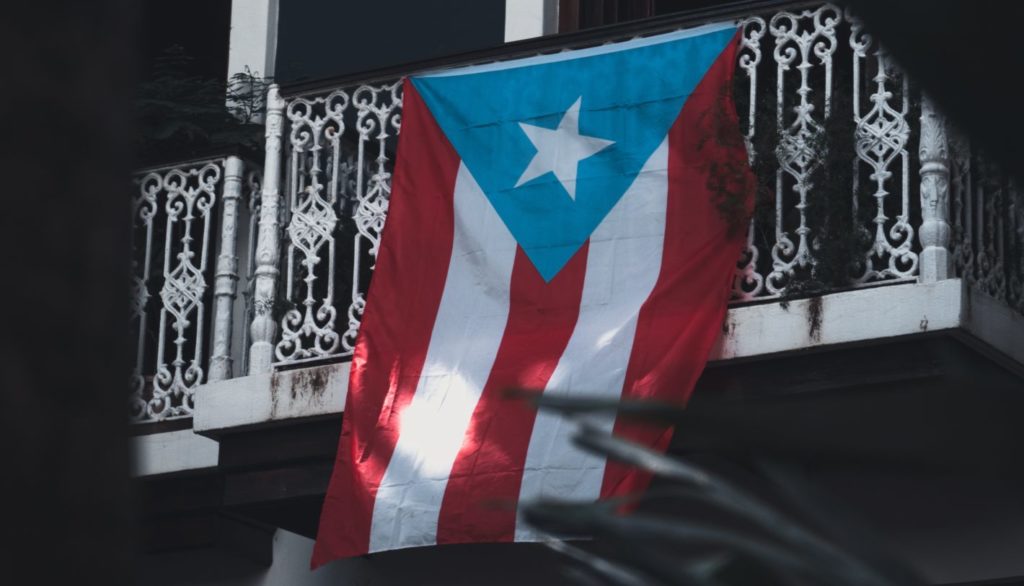On Saturday, August 14, 2021, we had a demonstration, march and rally at the State Capitol in San Juan, Puerto Rico to demand that the progressive governor, Pedro Pierluisi of the New Progressive Party (NPP), withdraw the implementation of gender ideology from the country's public policy and especially from the school curriculum. It was a massive rally initiated by the Pro Life and Family Coalition, led by an evangelical singer. The demonstration was a great success and attracted close to 100,000 people. It brought together many Protestants (pastors and faithful) and Catholics. Even a small group of legislators attended. Daniel Fernandez Torres of Arecibo, several priests, nuns and thousands of lay people who wanted to defend the natural and divine rights of parents to educate their children according to their own convictions.
Agustín Laje, a young Argentine political scientist, lecturer and writer, also addressed the crowd. He pointed out that there are small but very powerful groups that impose their ideologies in an outrageously anti-democratic way. Instagram recently censored him and closed his account with more than half a million subscribers, for not agreeing with his excellent arguments.
Genesis and development of gender ideology
Gender ideology (GI) is an intolerant, anti-scientific, elitist (i.e. anti-democratic) and rabidly anti-Christian proposal that has been growing especially in the last quarter of the 20th century and has reached its political apogee in our days. Although it appears to defend isolated initiatives and promotes "new rights", it has a well-structured political agenda and well studied and carefully implemented means and processes, especially through the judiciary.
Like any ideology, it has a basic creed that cannot be questioned, that pretends to explain everything in a reductive way. It denies all evidence, data or experiences that are contrary to it, excommunicating or denying it the right to offer alternatives and directs towards specific solutions to be implemented with the seizure of power. In the case of IE, it is necessary to "deconstruct" the concept of the family, of human nature and finally of religion. It is a kind of cultural Marxism. It has changed the oppressors and the oppressed of the 19th century Marxists, who are no longer the capitalists and the workers: the real oppressed are women and all those who do not fit into the heterosexual binary.

The well-known and powerful Bolshevik leader Alexandra Kollontai (1872-1952) believed that both the state and the family would be extinguished with the advent of a more advanced communism. The working woman could not be free unless she was guaranteed the right to choose whether or not to become pregnant. She would have the right to terminate unwanted progeny, so the free right to abortion had to be guaranteed. Marriage and the traditional family were legacies of the selfish and oppressive past based on property rights. Under communism both men and women would work and be supported by society, not by the family. Children would also properly belong to society, which would be responsible for raising them.
EI was revived on the occasion of the sexual revolution of the 1960s. Simone de Beauvoir, as well as the American psychiatrists John Money and the psychoanalyst Robert Stroller and the American feminists Juliet Mitchel, Nancy Chrodow, Jessica Benjamin, Jane Gallop, Bracha Ettinger, Shoshana Felman, Griselda Pollock, Jane Flax and Sulamith Fireston, among others, have assumed, disseminated and promoted it. The main objective of this ideology is to make the biological distinction between male and female disappear. One is not born male or female, but rather society assigns or imposes a role, a "gender". Exclusively binary sexual differentiation (like class differentiation for the Marxists of the 19th century) is part of a structure of oppression that has also invented marriage. These roles are functions that can and must be changed socially. The new society without biologically fixed sexes will be made up of people liberated from the old moral norms. In its many varieties of genders (the LGBTQ+) all these equally valid options will coexist in a peaceful paradise.
Marxist feminists insist on developing policies that highlight the oppression of women by patriarchal male chauvinists. For many feminists it is best to exclude males from all family roles. The popular culture generated by Hollywood and the Mass Media? (MCS) has often generated a negative image of men as fathers, urging young men to rebel against inept dads. This has accelerated the war against fathers: they are ridiculed, criminalized and marginalized. With the de facto exponential growth of single-parent families, assisted reproduction and express divorce, more and more children are living in families without a father figure. This combination of new de facto families and new models of "families" has borne much fruit in the United States, the European Union and even the United Nations. In the United Nations, especially since the summits on population in Cairo in 1994 and on women in Beijing in 1995, many of its agencies have adopted and promoted EI as part of their official policy.
During the 21st century the LGBTQ+ "collective" has joined the "new normal." They join protests against racial oppression, imperialism and gender identity issues. Laws, with their manifest pedagogical force, as well as educational policies, are two means of profoundly changing the functioning of a society and of limiting the right of the family in the educational mission, favoring state control. The promoters of EI have succeeded in getting many Western states to demand indoctrination in their theories or paradigms in both schools and colleges. Any individual who questions these new "dogmas" runs the risk of being disqualified with labels that denigrate those who oppose them and are punished economically and socially, ruining their image and reputation and even their survival.
Gender ideology spreads in Puerto Rico
In Puerto Rico, which has been in a process of rapid and aggressive secularization, gender ideology began to become official as state policy with the advent of the first governor, Sila María Calderón, of the Popular Democratic Party (PDP) from 2001 to 2005. This party identifies with the Democratic Party of the United States. In April 2001, she created the Office of the Women's Advocate and charged her with the duty of ensuring that public policy is based on a gender perspective. It also redefines the family in the laws and even redefines domestic violence from a gender perspective. With Law 108 of 2006, alliances begin to be created to give the Women's Advocate the power to train and review all curricula of the Department of Education to encourage critical analysis of the curriculum with a "gender perspective", provide tools to develop curricula based on gender equity, and identify how the gender perspective can be integrated into education. This is Contract Number 2008-000075 between the Department of Education and the Office of the Women's Advocate. Circular Letter No. 3 2008-2009 indicated that it was the Public Policy of the State to incorporate the Gender Perspective in Puerto Rican Public Education. The reform of the Civil Code that ran in parallel also sought to redefine the family and make room for this change in language.
Governor Luis Fortuño, of the New Progressive Party (NPP) 2008-2012, ordered the repeal of the circular letters to the Dept. of Education that endorsed such gender orientation. But when the PDP returned to power with Governor Alejandro García Padilla (2012-2016), another circular letter, CC 9-2013-2015, reinstated the official nature of gender ideology as a necessary reference in public education, favoring the diversity of affective-sexual orientations. In addition, an attempt was made to limit domestic education (homeschooling). This circular sparked the massive demonstration of February 16, 2015 in front of the country's Capitol.
Today Puerto Rico is experiencing political fragmentation. In the November 2019 elections, the two hegemonic parties (the PDP and the NPP) that have alternated in power since 1969, now have to seek support from three small parties, the always minuscule independentistas and two of them entirely new, the Movimiento Victoria Ciudadana and Proyecto Dignidad in order to legislate. Unfortunately, only one new party, the Christian-inspired Proyecto Dignidad, fully supports respect for family and parental rights. The other parties, including the more conservative NPP, whose candidate, Pedro Pierluisi, is the current Governor (2020-2024), have officially biased their government platforms in favor of gender ideologues.
Principle of subsidiarity and the rights and contribution of the family
Gender ideology ignores the principle of subsidiarity. The Compendium of the Social Doctrine of the Church reminds us that this principle protects people from the abuses of higher social levels and urges the latter to help individuals and intermediate bodies to carry out their tasks. Each person, family and intermediate body has something original to offer to the community. Experience shows that the denial of subsidiarity, or its limitation in the name of an alleged democratization or equality of all in society, limits and sometimes even cancels out the spirit of freedom and initiative. It ends up being a kind of official state monopoly.
Any social model that seeks the good of man cannot do without the centrality and social responsibility of the family. Society and the State, in their relations with the family, have the obligation to abide by the principle of subsidiarity. By virtue of this principle, the public authorities must not take away from the family the tasks which it can perform alone or freely associated with other families; on the other hand, the same authorities have the duty to assist the family, assuring it the help it needs to assume adequately all its responsibilities.
Pope Benedict XVI also warned us in his Encyclical Letter Caritas in veritate that in today's social and cultural context, in which the tendency to relativize what is true is widespread, living love in truth leads us to understand that adherence to the values of Christianity is not only a useful element, but indispensable for the construction of a good society and true integral human development. A Christianity of love without truth can easily be confused with a reserve of good sentiments, useful for social coexistence, but marginal. In this way, there would be no true and proper place for God in the world. Without truth, charity-love is relegated to a reduced and private sphere of relationships. It is excluded from the projects and processes for building a human development of universal scope, in the dialogue between knowledge and operativity. It is necessary to unmask the false slogan that love is love and that it is necessary to celebrate all the "loves" that individuals may desire.

An essentially secular group is demanding respect for the family from the State and many of the leading components of society are not interested in the demand. This march affirmed the priority of the family with respect to society and the State. The family, subject of inviolable rights, finds its legitimacy in human nature and not in the recognition of the State. The family is not, therefore, in function of society and the State, but society and the State should be in function of the family. The family, a community of persons, is therefore the first human "society". A society tailored to the family is the best guarantee against any individualistic or collectivist tendency, because in it the person is always the center of attention as an end and never as a means.
The family, the natural community in which human sociability is experienced, contributes in a unique and irreplaceable way to the good of society. The family community is born from the communion of persons: "Communion" refers to the personal relationship between the "I" and the "you". The "community", on the other hand, goes beyond this scheme by pointing towards a "society", a "we". Without families strong in communion and stable in commitment, peoples are weakened.
The media are unaware of the demonstration.
Puerto Rico's mass media showed their contempt for these outraged citizens. None of the mass media, television channels in their newscasts, radio programs and newspapers mentioned the rally. It is as if it did not exist. The synchronized punishment of the managers with their silence and indifference is very effective. What is not published does not exist.
On the other hand, if five members of the LGBTQ+ community make a protest somewhere, it is on the front page with photos and with the support of the editor. Nearly 100,000 citizens gather to make their complaint to the Governor and the Governor does not listen to them and the press does not admit that a mass event happened. How dishonest! It is not that the reporters agree with the claim, it is a matter of notifying a remarkable event... We see once again that the Taliban of the gender ideology demonstrate their unquestionable power in the management of public opinion.
Several days passed until some radio commentators pointed out the dishonest silence of the media... But the saddest part of this whole process is that all the governors who have supported gender ideology claim to be Catholics... A tremendous task is still pending: that the Catholic laity of the country know and implement the Social Doctrine of the Church.
Pastor of the Grotto of the Blessed Virgin Mary of Lourdes.








